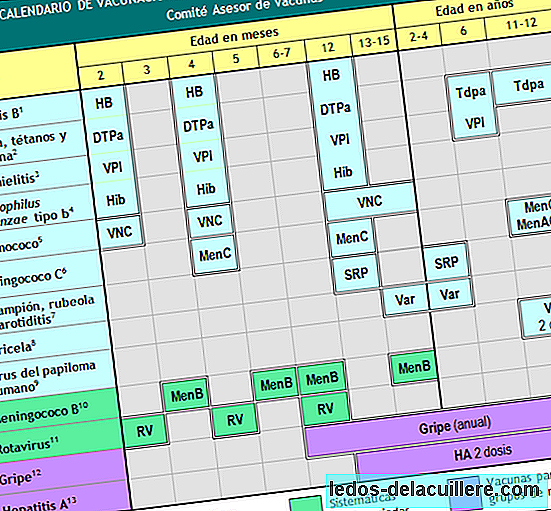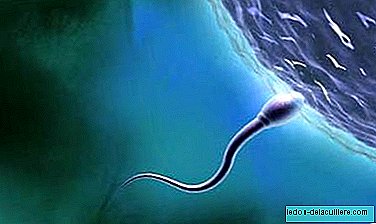In January, as happens every year, the Spanish Association of Pediatrics It makes public the recommended vaccine calendar for each year with the intention that all the autonomous communities of the country accept it and finally ends with the strange difference of criteria between them, which causes that there are various calendars that only confuse to professionals and mothers, especially if they move to other communities.
As already published on vaccine schedule for 2016, updated with the latest recommendations, we will now explain what they are the main news and differences compared to last year.
2016 Vaccine Calendar

Seen this way parents who remember when your children were vaccinated will quickly see that less doses are recommended for babies this year than in previous years, because at six and at 18 months they got vaccinations and now they don't. But we will explain the changes in a more concrete way so that you can see what the differences are with respect to the previous year.
The changes with respect to the year 2015
- Change in the vaccination schedule of hexavalent (diphtheria, tetanus, whooping cough, Haemophilus influenzae type b, hepatitis B) that passes from a 3-dose schedule at 2-4-6 months and a fourth without hepatitis B at 18 months to a new guideline 2-4-12 months. In this way a vaccine is given less of all of them, although in order not to diminish the protection for poliomyelitis a fourth dose is added at 6 years, when the tetanus, diphtheria and pertussis vaccine is administered.
- The vaccination schedule against meningococcus C that was suggested last year is reaffirmed and many Autonomous Communities have not yet adopted, with a scheme 2-4-12 months or 4-12 months, according to the brand of the vaccine, and a last one at 12 years old, for when the ACWY conjugated tetravalent meningococcal vaccine is recommended.
- Faced with pertussis outbreaks and the limited immunity of this vaccine, it is recommended to continue with a dose at 6 years and it is insisted that the vaccine given at 11-12 years is not that of tetanus and diphtheria, but that of tetanus, diphtheria and pertussis.
- The vaccination schedule of the Prevenar vaccine is modified, since this year the vaccine is introduced throughout the country, to a standard 2-4-12 months. By vaccinating all children, group immunity makes it possible to administer a less dose.
- The introduction of the meningococcal B vaccine, Bexsero, to the systematic calendar (it makes no sense that the C be administered without cost and the parents have to pay the B) with a 3-5-7 schedule and a booster dose between 13 and 15 months (or the schedule that should be be carried out according to the age of the baby, since after 6 months the recommended doses are three in total and after 2 years they are two).
- The vaccination schedule is maintained for triple viral and 2-dose chickenpox, extending the age of application of the second dose to 4 years (between 2 and 4 years of margin).
- With respect to the vaccine of the chickenpox, your definitive inclusion in the calendar, as announced a few months ago and its availability in Spanish pharmacies.
- The government is asked to study new forms of financing to facilitate the acquisition of vaccines not included in the free calendar by Spanish families (in my case, for example, if I want to vaccinate my children of the Bexsero I would have to spend a total of 630 euros in a period of about two months)
- The recommendation to vaccinate all pregnant women from the 27th week of pregnancy of the tetanus, diphtheria and pertussis vaccine, in order to protect the baby from this last disease, this vaccine being more important than the one given to 6-year-old children (currently there is limited supply and the vaccine is exactly the same, so it is considered a priority to vaccinate pregnant women before children 6 years old). In addition, when there are more doses, it is recommended to vaccinate members of the family environment of newborns, especially the mother in the immediate puerperium if she has not been vaccinated during pregnancy.
Come on, that taking into account the data available, both of efficacy and efficiency of vaccines, and with epidemiological data in hand, the AEP has considered that you have to put some vaccine less (Right now I would say to the anti-vaccinations that "notice what interest there is to vaccinate indiscriminately that instead of putting more vaccines they will get less", although I would probably receive an answer "is not more than a strategy to make people believe that in They really have no interest in controlling the population through vaccines and enriching pharmaceutical companies, when that interest does exist ").
Now we just have to All these changes are applied throughout the country (This seems complicated, seen what has been seen) and that governments begin to fulfill what was promised: that Prevenar is in the whole country, that chickenpox returns to pharmacies and is also for everyone, and already in passing, that the batteries with the Bexsero, don't you think?












